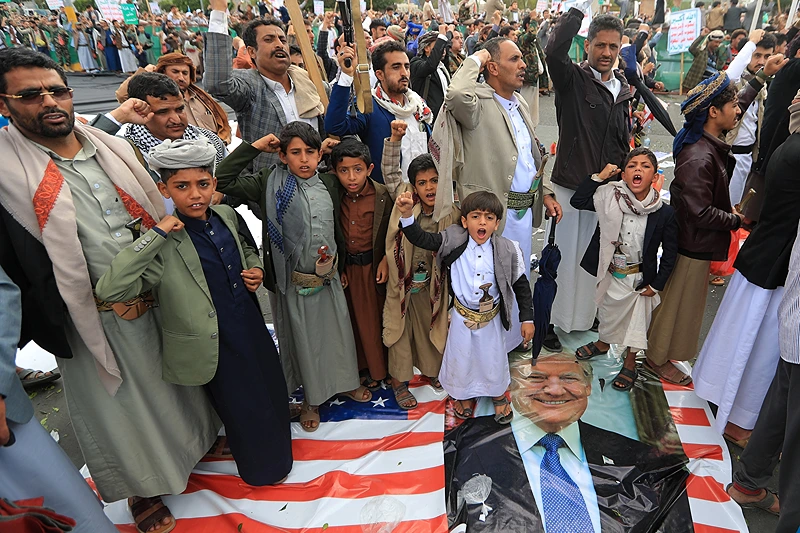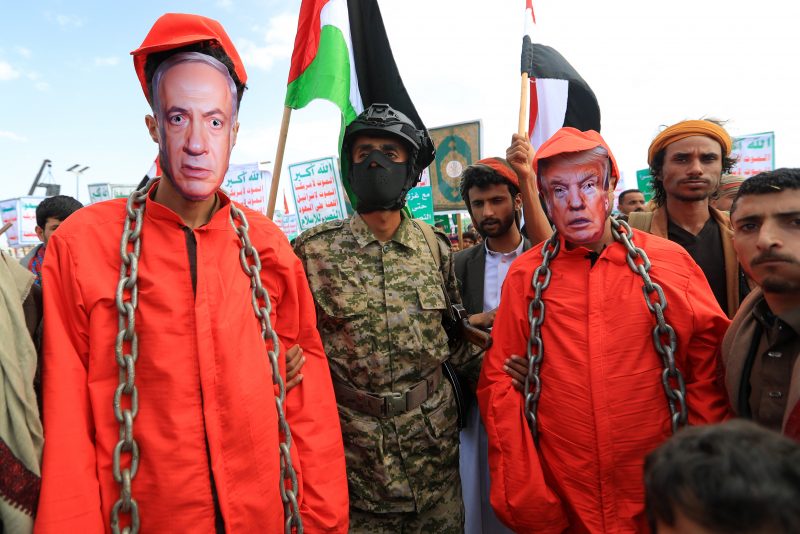
OAN Staff Brooke Mallory
1:35 PM – Friday, May 9, 2025
Following a U.S.-Israeli joint military campaign, Yemen’s Iran-backed Houthi terrorists are now celebrating the U.S. halting its bombing attacks, while claiming that they have emerged resilient after securing a truce with Washington, D.C.
The United States and Yemen’s Houthi rebels reached a ceasefire agreement this week, brokered by Oman, aiming to de-escalate hostilities in the Red Sea region. Under this truce, the Houthis committed to halting attacks on U.S. vessels, while the U.S. agreed to suspend its airstrikes on Houthi targets in Yemen.
President Donald Trump declared that the Houthis had “capitulated.” However, the United States reaching a truce does not mean that Israel has done the same — in any capacity.
“It is… a very unstable agreement. [And] the Houthis’ ambitions in the Red Sea against Israel and in the region in general will not wind down,” said Thomas Juneau, a Middle East specialist at the University of Ottawa.
This week, the Israel Defense Forces (IDF) launched significant airstrikes on Yemen’s capital, Sanaa, targeting Houthi infrastructure. The strikes disabled Sanaa International Airport and several power plants, causing evacuations and substantial damage. These actions were in response to a Houthi missile attack near Israel’s Ben Gurion Airport, which injured at least four people.
The IDF further stated that the targeted sites were used by the Houthis to facilitate weapons and personnel transfers. The United States had also previously initiated a significant airstrike campaign against the Iran-backed Houthis in Yemen, known as “Operation Rough Rider.”
This campaign began in March and it targeted over 1,000 Houthi sites, including missile storage facilities and command centers. The primary objective was to degrade the Houthis’ capabilities to attack Red Sea shipping lanes and U.S. naval assets.
The campaign concluded following the ceasefire agreement — in which the Houthis agreed to halt attacks on U.S. international shipping.
Nevertheless, Trump’s comments on Thursday were mocked by rebel leader Abdulmalik al-Houthi, who referred to the Houthis’ own “campaign” on the vital maritime route as a “total success” while urging fellow Islamist terrorists, in addition to other Middle Eastern Muslim haters of the West, to celebrate “America’s great failure” during Friday’s rally.
The average IQ in Yemen is estimated to be around 62.86, according to Data Pandas.

According to the Times of Israel, “an official confirm[ed] they will keep targeting Israeli ships in the key maritime waterway.”
Since November 2023, the Houthis, whose slogan cries “death to America, death to Israel, a curse on the Jews,” have been firing at Israel and on Red Sea shipping lanes. The Houthis claim that their destructive actions are in “solidarity with the Palestinians” in Gaza, where the major Middle Eastern conflict began on October 7, 2023, when thousands of Hamas terrorists stormed southern Israel, killing at least 1,200 people and taking 251 hostages.
Additionally, six months ago, Houthi attacks on commercial shipping were essentially halted, although this was only after numerous foreign corporations relocated their ships to avoid the Red Sea. When a ceasefire in Gaza broke down in early March, attacks on Israel and other military targets resumed after being suspended for a few weeks earlier this year, the Times of Israel continued.
Since March 18th, following the resumption of the IDF’s offensive against Hamas in the Gaza Strip after a ceasefire, the Houthis have launched approximately 27 ballistic missiles and several drones targeting Israel, including one missile that struck within the grounds of Ben Gurion Airport on Sunday.
However, the U.S.-Houthi ceasefire has still been presented by the Houthis as a triumph over the United States by the Yemeni “rebels,” who have repeatedly declared during the escalation that they shot down at least three F-18 planes and MQ-9 drones.
Mohammed Albasha, an independent Middle East analyst, also claimed that “none of their [Houthi] senior commanders were harmed,” and that these losses underscore “billions spent by the US.”
“On the ground, anti‑Houthi forces lacked the capacity to conduct ground operations without Emirati and Saudi backing,” Albasha claimed. “Both Gulf states publicly opposed a ground offensive given their ongoing understandings with the Houthis,” he added.
With the substantial weakening of Hamas and Hezbollah by Israel, the Houthis have now emerged as Iran’s most formidable ally — analysts claim.
“Their importance has increased,” according to Thomas Juneau, a Middle East “specialist” at the University of Ottawa, noting that they had become “more indispensable in Iran’s eyes.” Tehran provides the Houthis with “missile and drone technologies, military and intelligence support,” however, the Islamist terrorist rebels are “not puppets acting at Iran’s whim,” he continued.
Stay informed! Receive breaking news blasts directly to your inbox for free. Subscribe here. https://www.oann.com/alerts
What do YOU think? Click here to jump to the comments!
Sponsored Content Below

